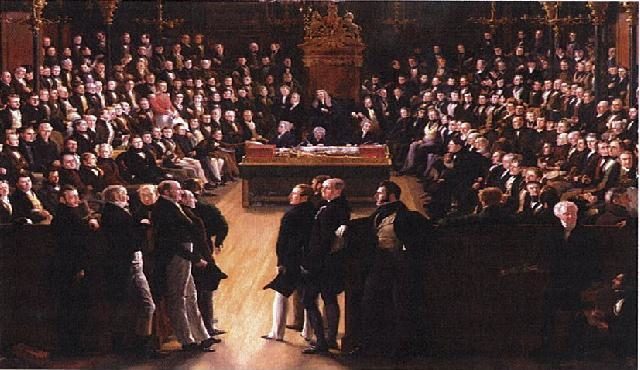
This week marks the 190th anniversary of the Great Reform Act, the moment the UK took its first meaningful stride towards becoming a democracy that represented the people rather than a narrow aristocracy. As we mark today, it is fitting to remember that while the UK has had a Parliament for the best part of a millennium, it has only been a democracy in the true sense for around a century, following the introduction of universal suffrage.
The struggle to make Britain a democracy started in earnest with the battle over the first Great Reform Act. That struggle was touched off in the aftermath of the Napoleonic wars as landowners used their monopoly of parliament to enact the hated corn laws. These kept the price of corn artificially high to protect the profits of landowners as free trade began to flourish again after the Napoleonic wars. The result was sky-high bread and food prices for the rest of the country. Economic historians estimate that the Corn Laws financially hurt around 90 percent of the population while benefitting only the top 10 percent. However, this was also the legislation that inflamed the incipient popular movement for an expanded franchise.
During and since that struggle many have suffered and died to forge the democratic right we enjoy today, from the workers cut down in the Peterloo massacre through to the Chartists and Suffragettes. Their struggle was so that ordinary people, irrespective their gender or property ownership, could achieve their rights to be represented and heard in parliament. The culmination of this struggle was the creation of the Labour Party in 1900 to ensure that working people were properly represented in our legislature and Government.
Yet, almost two centuries since that first great stride was made towards the freedoms we have today, the fight for a representative democracy is not over. Today we still have an electoral system that skews against working people to keep right wing governments in with a minority of the vote.
The last elections showed just how slanted the current First Past the Post system has become against Labour. In 2019 we saw millions of Labour votes piling up in safe seats it already holds meaning that more and more of its support has no bearing on the handful of marginal constituencies that decide the Government.
In practice, this means it is getting easier for the Tories to win and hold power with a minority share of the vote. Latest analysis shows that Labour now needs a massive 12.7 percent poll lead to win a majority, whereas for the Conservatives it is just 3.5 percent. The reality is, FPTP is the only system that locks the left out of power and gifts the Tories an artificial advantage that guarantees them years in office.
Yet, momentum is building across the Labour movement for PR. More than 80% of Labour members support it and now unions are increasingly moving towards it. Unite dropped its support for FPTP at its conference last year, with General Secretary Sharon Graham later saying the vote was the union moving to support PR for the first time in its history.
Next week UNISON are set debate support for a fairer electoral system at their National Delegate Conference. Should Unison back PR, it would mean the county’s two largest unions would then be in favour of ditching FPTP. A clear sign that working people are calling time on our broken voting system.
This fight is just the latest chapter in a long history of trade unionist fighting for our democratic rights.
Over the last two centuries working people have struggled and fought to be represented in parliament. Each generation ensured that the next had a greater democratic inherence than they received. That struggle is not over.
The next step is to bring in system of voting that gives all voters an equal voice, not just the few.